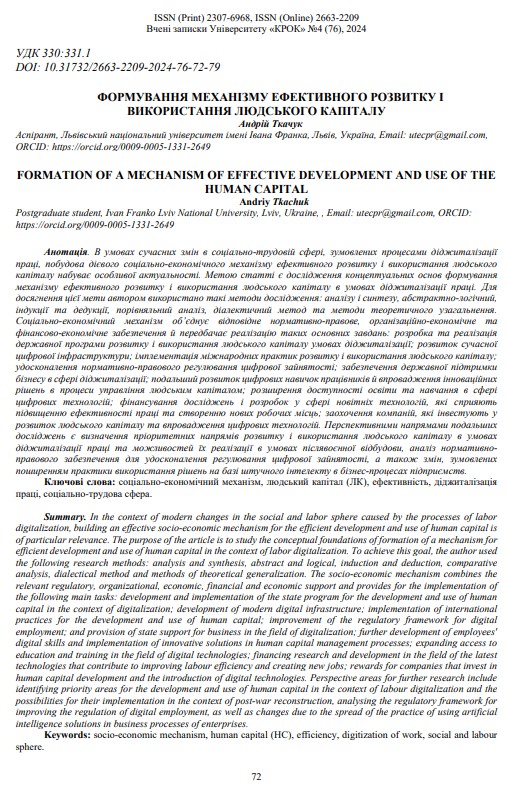FORMATION OF A MECHANISM OF EFFECTIVE DEVELOPMENT AND USE OF THE HUMAN CAPITAL
DOI:
https://doi.org/10.31732/2663-2209-2024-76-72-79Keywords:
socio-economic mechanism, human capital (HC), efficiency, igitization of work, digitization of work, social and labour sphereAbstract
In the context of modern changes in the social and labor sphere caused by the processes of labor digitalization, building an effective socio-economic mechanism for the efficient development and use of human capital is of particular relevance. The purpose of the article is to study the conceptual foundations of formation of a mechanism for efficient development and use of human capital in the context of labor digitalization. To achieve this goal, the author used the following research methods: analysis and synthesis, abstract and logical, induction and deduction, comparative analysis, dialectical method and methods of theoretical generalization. The socio-economic mechanism combines the relevant regulatory, organizational, economic, financial and economic support and provides for the implementation of the following main tasks: development and implementation of the state program for the development and use of human capital in the context of digitalization; development of modern digital infrastructure; implementation of international practices for the development and use of human capital; improvement of the regulatory framework for digital employment; and provision of state support for business in the field of digitalization; further development of employees' digital skills and implementation of innovative solutions in human capital management processes; expanding access to education and training in the field of digital technologies; financing research and development in the field of the latest technologies that contribute to improving labour efficiency and creating new jobs; rewards for companies that invest in human capital development and the introduction of digital technologies. Perspective areas for further research include identifying priority areas for the development and use of human capital in the context of labour digitalization and the possibilities for their implementation in the context of post-war reconstruction, analysing the regulatory framework for improving the regulation of digital employment, as well as changes due to the spread of the practice of using artificial intelligence solutions in business processes of enterprises.
Downloads
References
Брінцева О.Г. (2016). Трансформація людського капіталу в контексті зміни змісту праці в новій економіці. Україна: аспекти праці. - № 3-4. - С. 46-49.
Великий тлумачний словник сучасної української мови (з дод. і допов.) / Уклад. і голов. ред. В. Т. Бусел. – К.: Ірпінь: ВТФ «Перун», 2005. – 1728 с.
Грішнова, О. А. (2011). Нагромадження людського, інтелектуального і соціального капіталу підприємства як основна форма його капіталізації. Вісник Донецького університету економіки та права, (1), 10-13.
Грішнова, О. А., & Савченко, О. О. (2016). Фріланс: нові можливості і проблеми реалізації трудового потенціалу. Ринок праці та зайнятість населення, (1), 8-12.
Дмитрук, С. М. (2015). Формування соціально-економічного механізму збереження людського капіталу України в умовах кризи. Бізнес Інформ, (5), 59-64.
Ковальчук Т.М., Вергун А.І. (2020). Система принципів організації економічного аналізу [Електронний ресурс]. – Режим доступу: https://www.econ.vernadskyjournals.in.ua/journals/2020/31_70_5/18.pdf
Кравченко, І. С., Алексанян, А. Г. (2019). Фінансові інструменти розширення можливостей людського розвитку в інформаційній економіці. Фінансово-кредитна діяльність: проблеми теорії та практики, 1 (28), 506–514.
Лазаришина І.Д. (2017). Принципи економічного аналізу як інструмент забезпечення його якості [Електронний ресурс]. – Режим доступу: https://elartu.tntu.edu.ua/bitstream/lib/20971/2/DSESES_2017_Lazaryshyna_I_D-Pryntsypy_ekonomichnoho_96-98.pdf
Присяжнюк П.В. (2019). Механізм управління: сутність, види та складові [Електронний ресурс]. – Режим доступу: http://www.economy.nayka.com.ua/pdf/12_2019/152.pdf
Сімків Л.Є. (2019). Теоретичні засади формування організаційно-економічного механізму стимулювання економічного зростання у регіонах [Електронний ресурс]. – Режим доступу: https://chmnu.edu.ua/wp-content/uploads/2019/07/Simkiv-L.-YE..pdf
Соціально-трудові права і виклики цифровізації: монографія / кол. авт.; за ред. Я. В. Сімутіної, М. М. Шумила. Київ: Ніка-Центр, 2023. 348 с.
Тимошик Н.С. (2016). Вдосконалення механізмів регулювання фінансово-економічного забезпечення сталого розвитку економіки України [Електронний ресурс]. – Режим доступу: https://elartu.tntu.edu.ua/bitstream/lib/21287/2/SSEP_2016_Timoshik_N_S-Vdoskonalennia_mekhanizmiv_59-67.pdf
Трансформація зайнятості при переході до цифрової економіки: глобальні виклики та стратегії адаптації/ Н.А. Азьмук. – К.: Знання, 2019. – 335 с. – (Сучасна наука).
Туль С. І. (2020). Діджиталізація світового ринку праці: монографія / С. І. Туль, О. В. Шкурупій. - Полтава : ПУЕТ, 302 с.
Шевченко, І. О. (2022). Стратегія розвитку цифрової економіки в умовах глобалізації. Журнал стратегічних економічних досліджень. - № 6(11). – С. 79-86.
Azmuk, N., Grishnova, O., Kuklin, O. (2020). Digital Employment: Ukraine's Ranking in the Global Division of Digital Labour. Financial and Credit Activity Problems of Theory and Practice, 2(43), 380-391. Dоі: https://doi.org/10.55643/fcaptp.2.43.2022.3578
Bilan, Y., Oliinyk, O., Mishchuk, H., & Skare, M. (2023). Impact of information and communications technology on the development and use of knowledge. Technological Forecasting and Social Change, 191.
Brintseva O. (2023). Effectiveness of investment in human capital in Poland and Ukraine: directions of growth on the basis of comparative analysis. Zeszyty Naukowe Uniwersytetu Ekonomicznego w Krakowie, 1 (999), 31-46.
Grishnova, O., Cherkasov, A., Brintseva, O. (2019). Transition to a new economy: transformation trends in the field of income and salary functions. Problems and Perspectives in Management. Vol. 17, no. 2, pp. 18–31.
Kalenyuk, I., Grishnova, O., Tsymbal, L., Djakona, A., & Panchenko, E. (2020). Formation of intellectual corporate capital: methods and moderntrends. Bulletin the National academy of sciences of the Republic of Kazakhstan, 1(383), 182-191. https://doi.org/10.32014/2020.2518-1467.23
Kharazishvili, Y., Grishnova, O., & Kamińska, B. (2019). Standards of living in Ukraine, Georgia, and Poland: identification and strategic planning. Virtual Economics, 2(2), 7-36.
Męcina J. (2023). Od cyfryzacji i robotyzacji do sztucznej inteligencji. Wyzwania dla gospodarki i rynku pracy. Warszawa, Scholar, 234 s.
Petrova, I. L., Kravchenko, I. S., Lisogor, L. S., Chuvardynskyi, V.O. (2021). Еmployment flexibility in Ukraine: advantages and limitations. Financial and credit activity problems of theory and practice, 3 (38), 490-498.

Downloads
Published
How to Cite
Issue
Section
License

This work is licensed under a Creative Commons Attribution-NonCommercial 4.0 International License.

